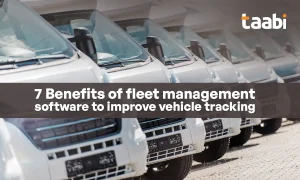Fleet management is the comprehensive oversight and coordination of a company’s fleet of vehicles. It involves a range of activities aimed at optimizing the performance, efficiency, and safety of the fleet. Fleet management solution typically encompasses activities like acquiring, maintaining, operating, and disposing of vehicles in a cost-effective manner.
A Fleet management system aims to enhance productivity, efficiency, and cost-effectiveness. It involves strategic planning to ensure the right number and types of vehicles are available to meet operational demands. It includes effective resource allocation to help maximize fleet utilization and minimize downtime. And, involves risk management to address factors such as driver safety, compliance with regulations, and insurance coverage.
By utilizing a robust fleet management system, businesses can reap numerous benefits. These include improved operational efficiency, reduced maintenance costs, increased driver safety, enhanced customer service, and better decision-making based on data-driven insights. Fleet management solution serves as a critical component for companies that rely on a fleet of vehicles to deliver products or services, helping them achieve their operational goals effectively.
What are fleet management systems?
In modern times fleet management systems refer to fleet management software that addresses the various core fleet management elements and fleet manager responsibilities. Typically such systems can offer vehicle acquisition for selecting the right types of vehicles for specific operational needs, considering factors such as payload capacity, fuel efficiency, and maintenance requirements. Fleet management software also offers maintenance management including tracking and scheduling routine maintenance tasks, inspections, and repairs to ensure vehicles remain in optimal condition. A Fleet management solution also focuses on fuel management, monitoring fuel consumption, and implementing strategies to minimize fuel costs, such as route optimization and driver training.
Fleet management systems are also engineered with Geofeced and GPS-based tracking systems and telematics systems. They provide real-time vehicle monitoring, enabling fleet managers to track vehicle locations, analyze driver behavior, and optimize routing. This information helps improve operational efficiency, reduce fuel consumption, and enhance overall fleet safety.
How does a Fleet management software function?
Data analytics, IoT engineering, embedded programming, and AI/ML, are four fundamental engineering concepts on which most modern fleet management systems are developed. The devices, functioning parts, and hardware on vehicles or assets are first integrated with modern digital sensors. These sensors relay real-time data on the status of their corresponding devices/parts/hardware to the fleet management software. The software is further programmed to process the data with proprietary AI algorithms, to either generate predictive insights or automate processes.
15 important roles and responsibilities of a fleet manager:
When it comes to providing an effective fleet management solution, the roles and responsibilities of the fleet manager are paramount. A fleet manager plays a crucial role in overseeing and optimizing a company’s fleet of vehicles, ensuring smooth operations, cost-efficiency, and regulatory compliance. Following are the key responsibilities and duties of a fleet manager.
1. Vehicle Acquisition and Disposal:
Fleet managers are responsible for determining the right types and number of vehicles needed for the fleet. They conduct thorough research, considering factors such as vehicle specifications, performance, fuel efficiency, and cost-effectiveness. Additionally, fleet managers handle the disposal of outdated or non-operational vehicles, ensuring compliance with legal and environmental regulations.
2. Fleet Maintenance Management:
Scheduling and coordinating regular maintenance, inspections, and repairs for the fleet are routine responsibilities of managers. They establish partnerships with reliable service providers, monitor service records, and ensure vehicles are in optimal condition. By implementing preventive maintenance strategies, fleet managers minimize costly breakdowns and extend the lifespan of vehicles.
3. Fuel Management for Fleets:
Managing fuel consumption is a significant responsibility of a fleet manager. They monitor fuel usage, analyze consumption patterns, and implement strategies to reduce fuel costs. This may include optimizing routes, promoting efficient driving practices, and leveraging technology solutions for fuel tracking.
4. Driver Behavior Monitoring, Management, & Training:
A fundamental responsibility of a Fleet manager is to oversee driver selection, training, and performance evaluation. They ensure that drivers comply with safety regulations, maintain proper licensing, and adhere to company policies. Fleet managers may also organize training programs to enhance driver skills, improve fuel efficiency, and promote safe driving habits.
5. Regulatory Compliance:
Managers need to stay updated with relevant laws and regulations governing fleet operations at all times. They ensure that vehicles and drivers meet all necessary compliance standards, such as licensing, permits, inspections, and emissions testing. By maintaining compliance, fleet managers minimize legal risks and ensure the company’s reputation remains intact.
6. Fleet analytics and Reporting:
Fleet managers leverage technology tools and systems to collect and analyze fleet data. They generate insightful reports on key performance indicators, such as vehicle utilization, maintenance costs, fuel efficiency, and safety records. This data-driven approach helps fleet managers make informed decisions, identify areas for improvement, and optimize fleet performance.
7. Route Optimization:
Route optimization for maximizing efficiency and minimizing travel time and fuel consumption, is yet another crucial responsibility. Fleet managers utilize GPS and route planning software to identify the most efficient routes, taking into account factors such as traffic, road conditions, and delivery schedules. By optimizing routes, fleet managers can improve productivity, reduce fuel expenses, and enhance customer satisfaction through timely deliveries.
8. Budgeting and Cost Control:
One of the most prominent tasks in providing fleet management solutions is developing and managing budgets for the fleet. Managers analyze expenses related to vehicle acquisition, maintenance, fuel, insurance, and other operational costs. By closely monitoring expenditures, fleet managers can identify cost-saving opportunities, negotiate favorable contracts with suppliers, and implement cost-control measures to ensure the fleet operates within budgetary constraints.
9. Safety and Compliance Training:
Fleet managers prioritize driver safety by implementing comprehensive safety programs and training initiatives. They ensure drivers receive appropriate training on defensive driving techniques, vehicle inspections, and emergency procedures. Additionally, fleet managers stay updated on safety regulations and industry best practices to ensure compliance and minimize accidents or violations.
10. Real-time fleet monitoring & Performance Analysis:
Regularly evaluating the performance of the fleet by analyzing key performance metrics, is a key role of fleet managers. They assess factors such as vehicle uptime, maintenance costs, fuel efficiency, driver productivity, and customer satisfaction. Through performance analysis, fleet managers can identify areas for improvement, implement process enhancements, and make data-driven decisions to optimize fleet operations.
11. Environmental Sustainability:
In today’s eco-conscious world, fleet managers have an increasing responsibility to prioritize environmental sustainability. They explore opportunities to reduce emissions, implement alternative fuel options, and incorporate electric or hybrid vehicles into the fleet. By adopting sustainable practices, fleet managers contribute to reducing the company’s carbon footprint and aligning with environmental goals.
12. Asset Management & Asset Tracking:
One of the primary responsibilities of a fleet manager is asset management. This involves acquiring, maintaining, and tracking vehicles within the fleet. You are responsible for ensuring the fleet has the right types and quantities of vehicles to meet operational needs. By implementing asset tracking systems, you can monitor vehicle locations, usage, and maintenance records, enabling effective fleet management and resource allocation.
13. Dispatch & Routing Management:
Efficient dispatch and routing management are essential for fleet operations. A fleet manager is responsible for coordinating vehicle assignments, optimizing routes, and ensuring timely deliveries. By utilizing advanced routing software and real-time data, a fleet manager can improve fleet productivity, reduce mileage, and enhance customer satisfaction through optimized dispatch and routing strategies.
14. Fleet Risk Management:
Managing risks associated with fleet operations is a critical responsibility of a fleet manager. This involves ensuring driver safety, maintaining compliance with regulations, and minimizing risks such as accidents or violations. A fleet manager may implement driver training programs, monitor driver behavior, and enforce safety protocols to mitigate risks and promote a culture of safety within the fleet.
15. Fleet Lifecycle Management:
Fleet lifecycle management involves overseeing the entire lifespan of fleet vehicles, from acquisition to disposal. A fleet manager is responsible for making informed decisions regarding vehicle purchases, lease agreements, and maintenance schedules. By implementing effective lifecycle management practices, a fleet manager can optimize vehicle utilization, minimize downtime, and control costs throughout the fleet’s lifecycle.
What are the key Fleet management system benefits?
Allocating effective fleet management software to the logistics processes of your business can yield numerous business benefits. Here are the key fleet management system advantages:
Cost Savings:
Fleet management software can optimize resource allocation and reduce operational costs. By closely monitoring fuel consumption, maintenance schedules, and vehicle utilization, businesses can identify inefficiencies and implement strategies to minimize expenses. Route optimization and driver performance evaluation further contribute to fuel savings and increased cost-effectiveness.
Improved Efficiency:
Fleet management systems enable businesses to streamline operations and improve overall efficiency. Real-time tracking and monitoring of vehicles allow for better coordination, enhanced dispatching, and reduced idle time. Optimized routing ensures timely deliveries and maximizes productivity. Additionally, automated maintenance scheduling prevents unexpected breakdowns and improves vehicle uptime.
Enhanced Safety:
The process of fleet management solution prioritizes driver safety, minimizing the risk of accidents and ensuring compliance with safety regulations. Fleet managers can monitor driver behavior, identify areas for improvement, and provide targeted training. Safety features such as driver alerts and telematics systems help promote safe driving practices, reducing the likelihood of accidents and associated costs.
Data-Driven Insights:
In the current information age Fleet success relies heavily on valuable data and real-time analytics. By harnessing the power of data, businesses gain insights into driver behavior, fuel consumption, maintenance trends, and overall fleet performance. Data-driven decision-making enables many fleet management system advantages like proactive measures, predictive maintenance, and strategic planning, leading to improved operational efficiency and informed business choices.
Enhanced Customer Service:
Better customer service is one of the major fleet management system advantages. Accurate tracking of shipments and real-time updates on delivery status allow businesses to provide accurate information to customers. Optimized routing ensures on-time deliveries, reducing delays and improving customer satisfaction.
Compliance and Risk Management:
Fleet management helps businesses stay compliant with regulatory requirements, including licensing, inspections, and emissions standards. This minimizes legal risks and potential penalties. Fleet management systems also enable proactive risk management by identifying and addressing potential safety hazards, ensuring a safer working environment.
Comprehensive fleet management solution with Taabi’s proprietary AI-driven SaaS platforms
Modern innovative solutions, powered with cutting-edge technology to overcome the traditional fleet management system challenges
Our AI-powered fuel management system revolutionizes the way you manage your fleet’s fuel consumption. By leveraging advanced algorithms and real-time data analysis, we help you reduce fuel costs and increase overall efficiency. Our system monitors fuel consumption patterns, identifies areas of improvement, and provides optimized routes that minimize unnecessary mileage and fuel consumption. With our fuel optimization solution, you can achieve significant savings while also contributing to a greener environment by reducing your carbon footprint. Say goodbye to wasteful fuel practices and embrace our cutting-edge technology to optimize your fleet’s fuel usage.
Driver behavior plays a crucial role in fleet safety and operational efficiency. Our AI-powered driver behavior solution is designed to promote safe driving habits and reduce risks on the road. Our system monitors and analyzes driver behavior in real-time, including factors such as speed, acceleration, braking, and adherence to traffic rules. With actionable insights and personalized training programs, we help your drivers enhance their skills and make better decisions on the road. By improving driver behavior, you can significantly reduce the likelihood of accidents, lower insurance costs, and enhance the overall safety of your fleet. Trust our driver behavior solution to empower your drivers with the knowledge and tools they need to prioritize safety and efficiency.
Keeping your fleet’s vehicles in optimal condition is essential for minimizing downtime and maximizing operational efficiency. Our AI-powered vehicle health solution ensures that you have a comprehensive view of your fleet’s maintenance needs in real-time. By monitoring critical parameters such as engine performance, tire pressure, and battery health, our system identifies potential issues before they become major problems. With proactive maintenance alerts, you can schedule timely repairs and preventive measures, avoiding costly breakdowns and unexpected disruptions. Our vehicle health solution empowers you to stay one step ahead, maintaining the reliability and performance of your fleet while minimizing maintenance costs and improving overall productivity.
Simplify and enhance your fleet’s security and accessibility with our Geo-fenced digital lock solution. Our advanced SaaS platform provides secure and convenient remote locking and unlocking capabilities for your fleet vehicles. With our user-friendly interface, you can easily manage access permissions, track vehicle usage, and monitor security in real-time. Whether you need to grant access to authorized personnel, remotely lock a vehicle in case of theft or misuse, or streamline vehicle pick-ups and drop-offs, our digital lock solution offers the flexibility and control you need. Say goodbye to cumbersome physical keys and embrace the efficiency and convenience of our digital lock solution for seamless fleet management.
Achieve complete visibility and control over your fleet operations with our control tower solution. Powered by AI, our platform provides real-time tracking, data analytics, and centralized management tools in one comprehensive system. Monitor your fleet’s location, route progress, and performance metrics effortlessly. Make data-driven decisions by leveraging actionable insights and intuitive visualizations. Optimize routing, improve resource allocation, and respond promptly to any disruptions or delays. With our control tower solution, you can streamline operations, enhance efficiency, and boost profitability by effectively managing your fleet from a single, integrated platform. Empower your business with the power of AI and take your fleet management to new heights.
FAQs on Fleet Management Software
Q. What is a fleet management system?
A. A fleet management software or system is a comprehensive software solution that helps businesses effectively manage their fleet of vehicles. It includes features such as vehicle tracking, maintenance scheduling, fuel optimization, driver management, and data analytics.
Q. What is an example of fleet management system?
A. An example of a fleet management system is Taabi’s suite of fleet management solution. Our suite of SaaS platforms includes multiple robust software that offers real-time vehicle tracking, automated maintenance reminders, driver behavior monitoring, and customizable reporting. It empowers businesses to streamline operations and maximize fleet efficiency.
Q. What is the best fleet management software?
A. The best fleet management software varies based on specific business needs. However, top-rated options include GeoTab, Taabi, SAP, and Fleetio. These software solutions offer a range of features, intuitive interfaces, scalability, and excellent customer support.
Q. What is the function of fleet management System?
A. The function of a fleet management solution or system is to simplify and optimize various aspects of fleet operations. It helps with vehicle tracking, maintenance scheduling, fuel management, driver monitoring, route optimization, compliance management, and data analysis. The system ensures better control, cost-effectiveness, and improved productivity.
Q. What is fleet in logistics?
A. In logistics, a fleet refers to a group of vehicles used for transporting goods or passengers. It can include trucks, vans, cars, or specialized vehicles. Fleet management in logistics involves efficiently managing these vehicles, ensuring timely deliveries, optimizing routes, and maintaining regulatory compliance.
Q. Why is fleet management important?
A. Fleet management software is important for businesses as it helps enhance operational efficiency, reduce costs, improve safety, and optimize resource allocation. It enables businesses to track vehicles, monitor driver behavior, streamline maintenance, and make data-driven decisions. Effective fleet management solution ultimately leads to improved profitability and customer satisfaction.
Q. What is fleet management system in SAP?
A. In SAP, a fleet management system is an integrated solution that enables businesses to manage their fleet within the SAP environment. It offers features such as vehicle registration, fuel management, maintenance planning, accident management, and reporting. SAP’s fleet management system helps businesses streamline fleet-related processes and leverage SAP’s powerful capabilities. Our Taabi platforms can also seamlessly integrate with your SAP data.
Q. What is fleet planning?
A. Fleet planning involves strategic decision-making to effectively manage and optimize a fleet of vehicles. It includes determining the right fleet size, selecting appropriate vehicle types, analyzing routes, and considering factors such as fuel efficiency, maintenance costs, and regulatory compliance. Fleet planning ensures efficient resource allocation and supports long-term fleet management objectives.








